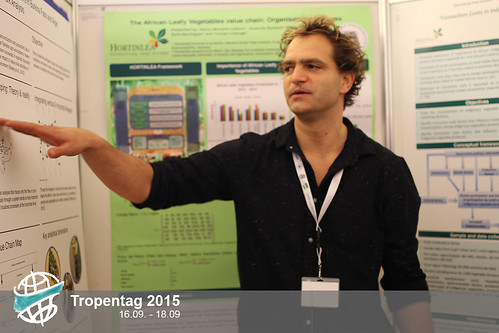Value Chains: Opportunities and Challenges in the Tropics and Sub-Tropics
When people talk about value chains, we may understand how products move from one actor to another, and of course when you are a researcher or a student you hear it from lectures; but do we really conceptualize value chains in the same way? Given the variety contexts and questions in which it is used, do researchers have a common, concrete definition for this concept, or is it a vague term that is used differently depending on the objectives of the researcher?
 Christian Klein
Christian Klein
The today’s session 5.2 just removed the uncertainties that value chains is a vague term we use. Today’s presenters gave concrete examples from places around the world such as Indonesia, Somalia, Kenya, Burkina Faso and Niger, Madagascar, Nigeria, Sudan and Ethiopia where the value chains concept has been used to analyze commodities varying from milk, cassava leaves, beef meat, and indigenous vegetables to fodder and natural fibbers (bamboo), quinoa, and baobab.
What do all those researchers have in common apart from presenting in the same Tropentag theme or in the same room? What are their approaches? Do they encounter the same problems?
Their studies involve actors, who are pretty much the same, namely producers at the bottom who sweat, cultivate, or take care of the livestock, brokers/traders, retailers, wholesalers and finally the consumers.
So why are they similar? Why does a milk producer have to go through the same process as a Kenyan cassava leaves producer? Because the products have an added value which would be translated into profit for the actors.
What are the actual challenges across value chains?
- High transaction cost from production to the end consumers, as said by Christopher Kiprono
- Unequal margin share among the actors, raised by Lisa Jackering
- Limited access to market and extension services, as explained by Claudia Stephanie Coral Guerra
- Weak linkages between agricultural sector and policy regimes, as emphasized by Temitayo Adenike Adeyemo
Opportunities:
- Contribution to food security of the smallholder farmers, suggested by Temitayo Adenike Adeyemo
- Value addition to agricultural products by Lisa Jackering
- Creation of a platform for policy design among different actors suggested by Nancy Munyiva Laibuni

In conclusion, researchers conceptualize the value chain the same way but with different implementation approaches. However, in the end they all have the same outcome: to improve livelihood and food security in tropics and subtropics regions.





Comments
Post new comment